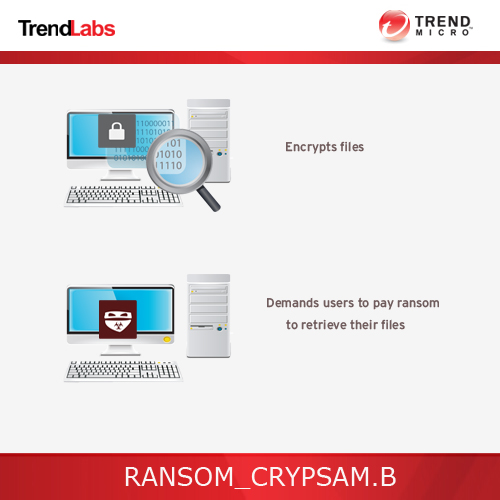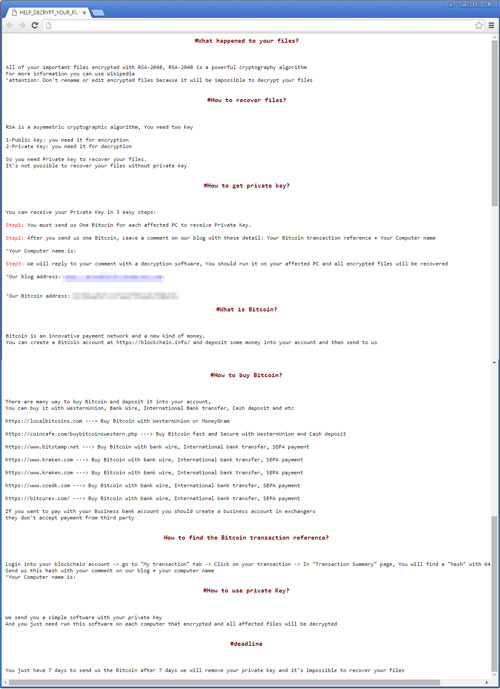RANSOM_CRYPSAM.B
Ransom:MSIL/Samas.A (Microsoft), Trojan-Ransom.MSIL.Agent.wc (Kaspersky), MSIL/Filecoder.AR (ESET)
Windows


Threat Type: Trojan
Destructiveness: No
Encrypted: No
In the wild: Yes
OVERVIEW
SAMSAM is the latest ransomware variant that hit healthcare industry, specifically the Kentucky Hospital. Based on reports, this malware is distributed via unpatched servers, instead of the usual infection vectors such as malicious websites or email attachments.
To get a one-glance comprehensive view of the behavior of this Trojan, refer to the Threat Diagram shown below.

This Trojan arrives on a system as a file dropped by other malware or as a file downloaded unknowingly by users when visiting malicious sites.
It deletes the initially executed copy of itself.
TECHNICAL DETAILS
Arrival Details
This Trojan arrives on a system as a file dropped by other malware or as a file downloaded unknowingly by users when visiting malicious sites.
Installation
This Trojan drops the following component file(s):
- {root drive}\HELP_DECRYPT_YOUR_FILES.html
- %Desktop%\HELP_DECRYPT_YOUR_FILES.html
- {folders containing encrypted files}\HELP_DECRYPT_YOUR_FILES.html
(Note: %Desktop% is the desktop folder, where it usually is C:\Documents and Settings\{user name}\Desktop in Windows 2000, Windows Server 2003, and Windows XP (32- and 64-bit); C:\Users\{user name}\Desktop in Windows Vista (32- and 64-bit), Windows 7 (32- and 64-bit), Windows 8 (32- and 64-bit), Windows 8.1 (32- and 64-bit), Windows Server 2008, and Windows Server 2012.)
It drops and executes the following files:
- {malware path}\selfdel.exe - used to delete the malware
- {malware path}\del.exe - legitimate Sysinternals SDelete program. The following command is executed to wipe free space on the disk to prevent recovery:
{malware path}\del.exe -c C: /accepteula
Other Details
This Trojan encrypts files with the following extensions:
- .xls
- .xlsx
- .doc
- .docx
- .ppt
- .pptx
- .txt
- .dwg
- .bak
- .bkf
- .pst
- .dbx
- .zip
- .rar
- .mdb
- .asp
- .aspx
- .html
- .htm
- .dbf
- .3dm
- .3ds
- .3fr
- .jar
- .3g2
- .xml
- .png
- .tif
- .3gp
- .java
- .jpe
- .jpeg
- .jpg
- .jsp
- .php
- .3pr
- .7z
- .ab4
- .accdb
- .accde
- .accdr
- .accdt
- .ach
- .kbx
- .acr
- .act
- .adb
- .ads
- .agdl
- .ai
- .ait
- .al
- .apj
- .arw
- .asf
- .asm
- .asx
- .avi
- .awg
- .back
- .backup
- .backupdb
- .pbl
- .bank
- .bay
- .bdb
- .bgt
- .bik
- .bkp
- .blend
- .bpw
- .c
- .cdf
- .cdr
- .cdr3
- .cdr4
- .cdr5
- .cdr6
- .cdrw
- .cdx
- .ce1
- .ce2
- .cer
- .cfp
- .cgm
- .cib
- .class
- .cls
- .cmt
- .cpi
- .cpp
- .cr2
- .craw
- .crt
- .crw
- .phtml
- .php5
- .cs
- .csh
- .csl
- .tib
- .csv
- .dac
- .db
- .db3
- .db-journal
- .dc2
- .dcr
- .dcs
- .ddd
- .ddoc
- .ddrw
- .dds
- .der
- .des
- .design
- .dgc
- .djvu
- .dng
- .dot
- .docm
- .dotm
- .dotx
- .drf
- .drw
- .dtd
- .dxb
- .dxf
- .dxg
- .eml
- .eps
- .erbsql
- .erf
- .exf
- .fdb
- .ffd
- .fff
- .fh
- .fmb
- .fhd
- .fla
- .flac
- .flv
- .fpx
- .fxg
- .gray
- .grey
- .gry
- .h
- .hbk
- .hpp
- .ibank
- .ibd
- .ibz
- .idx
- .iif
- .iiq
- .incpas
- .indd
- .kc2
- .kdbx
- .kdc
- .key
- .kpdx
- .lua
- .m
- .m4v
- .max
- .mdc
- .mdf
- .mef
- .mfw
- .mmw
- .moneywell
- .mos
- .mov
- .mp3
- .mp4
- .mpg
- .mrw
- .msg
- .myd
- .nd
- .ndd
- .nef
- .nk2
- .nop
- .nrw
- .ns2
- .ns3
- .ns4
- .nsd
- .nsf
- .nsg
- .nsh
- .nwb
- .nx2
- .nxl
- .nyf
- .oab
- .obj
- .odb
- .odc
- .odf
- .odg
- .odm
- .odp
- .ods
- .odt
- .oil
- .orf
- .ost
- .otg
- .oth
- .otp
- .ots
- .ott
- .p12
- .p7b
- .p7c
- .pab
- .pages
- .pas
- .pat
- .pcd
- .pct
- .pdb
- .pdd
- .pef
- .pem
- .pfx
- .pl
- .plc
- .pot
- .potm
- .potx
- .ppam
- .pps
- .ppsm
- .ppsx
- .pptm
- .prf
- .ps
- .psafe3
- .psd
- .pspimage
- .ptx
- .py
- .qba
- .qbb
- .qbm
- .qbr
- .qbw
- .qbx
- .qby
- .r3d
- .raf
- .rat
- .raw
- .rdb
- .rm
- .rtf
- .rw2
- .rwl
- .rwz
- .s3db
- .sas7bdat
- .say
- .sd0
- .sda
- .sdf
- .sldm
- .sldx
- .sql
- .sqlite
- .sqlite3
- .sqlitedb
- .sr2
- .srf
- .srt
- .srw
- .st4
- .st5
- .st6
- .st7
- .st8
- .std
- .sti
- .stw
- .stx
- .svg
- .swf
- .sxc
- .sxd
- .sxg
- .sxi
- .sxi
- .sxm
- .sxw
- .tex
- .tga
- .thm
- .tlg
- .vob
- .war
- .wallet
- .wav
- .wb2
- .wmv
- .wpd
- .wps
- .x11
- .x3f
- .xis
- .xla
- .xlam
- .xlk
- .xlm
- .xlr
- .xlsb
- .xlsm
- .xlt
- .xltm
- .xltx
- .xlw
- .ycbcra
- .yuv
It does the following:
- It appends the extension .encryptedRSA to the encrypted files
It deletes the initially executed copy of itself
NOTES:
The dropped HELP_DECRYPT_YOUR_FILES.html contains the following ransom note:

SOLUTION
Step 1
Before doing any scans, Windows XP, Windows Vista, and Windows 7 users must disable System Restore to allow full scanning of their computers.
Step 2
Search and delete these files
- HELP_DECRYPT_YOUR_FILES.html
Step 3
Scan your computer with your Trend Micro product to delete files detected as RANSOM_CRYPSAM.B. If the detected files have already been cleaned, deleted, or quarantined by your Trend Micro product, no further step is required. You may opt to simply delete the quarantined files. Please check this Knowledge Base page for more information.
Step 4
Restore encrypted files from backup.
Did this description help? Tell us how we did.


